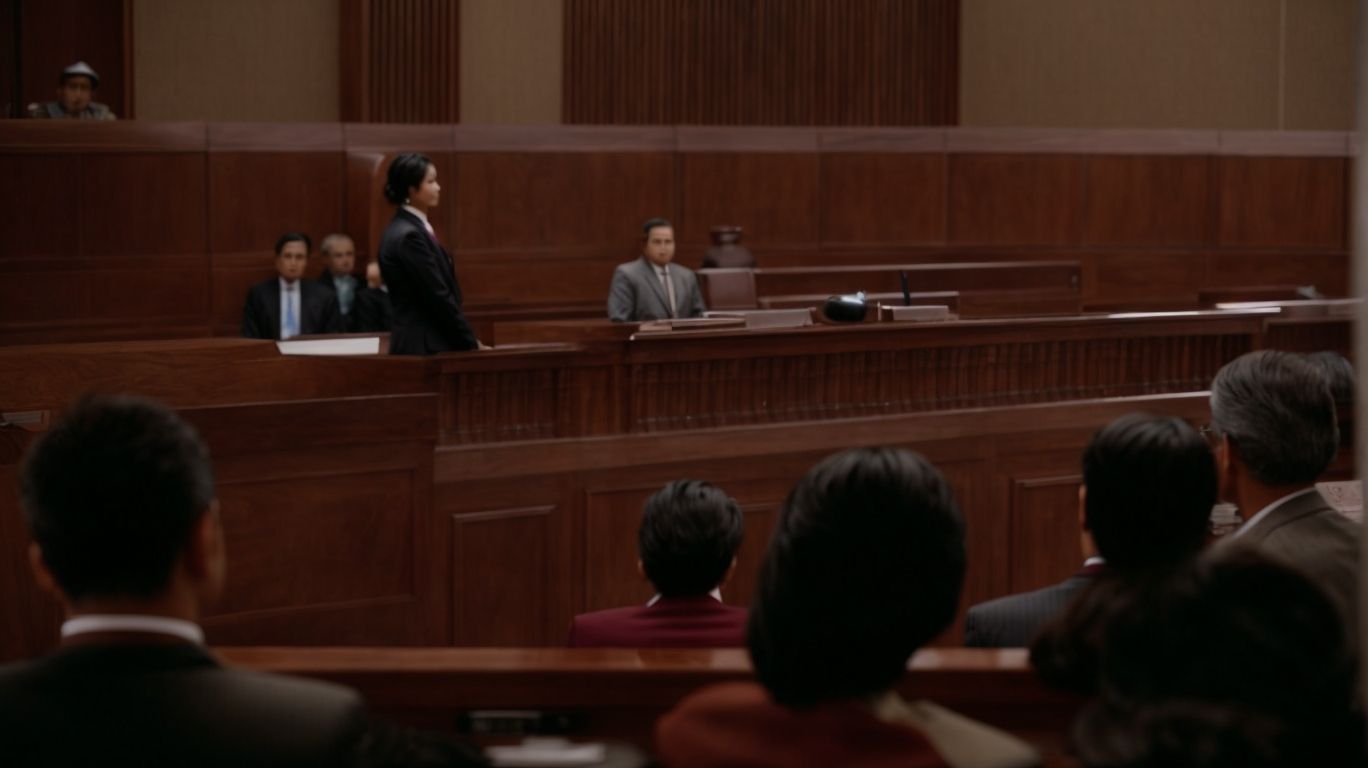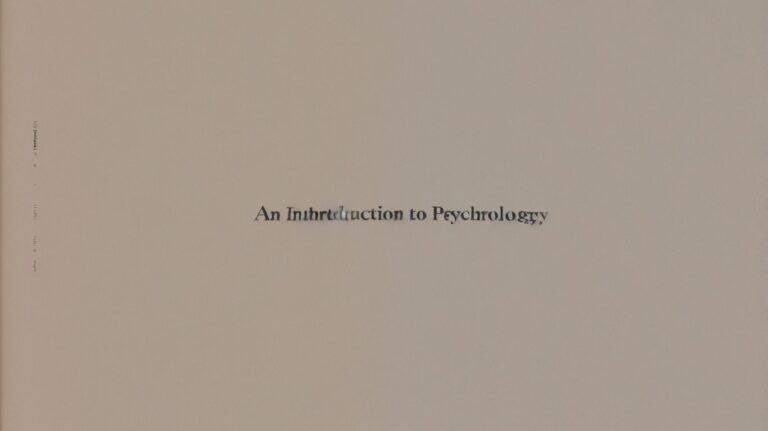Eyewitness testimony, a cornerstone of criminal justice, has long been considered a powerful form of evidence. Recent research has uncovered the potential for unreliability in these accounts.
This article will explore the various reasons why eyewitness testimony is considered unreliable, including memory distortion, leading questions, and cross-race identification bias. We will discuss the consequences of unreliable eyewitness testimony and strategies for improvement, such as cognitive interviewing techniques and video recording of police interrogations.
We will also examine other factors that can affect the reliability of eyewitness testimony, such as stress, age, and personal biases. Join us as we delve into the complex world of eyewitness testimony and its implications in psychology.
Contents
- 1 Key Takeaways:
- 2 What is Eyewitness Testimony?
- 3 Why is Eyewitness Testimony Considered Unreliable?
- 4 What are the Consequences of Unreliable Eyewitness Testimony?
- 5 How Can Eyewitness Testimony be Improved?
- 6 What Other Factors Can Affect the Reliability of Eyewitness Testimony?
- 7 Frequently Asked Questions
- 7.1 What is the unreliability of eyewitness testimony in psychology?
- 7.2 How does the unreliability of eyewitness testimony affect the criminal justice system?
- 7.3 Why is eyewitness testimony considered unreliable in psychology?
- 7.4 What are some common biases that can affect eyewitness testimony in psychology?
- 7.5 Can eyewitness testimony be trusted in court?
- 7.6 What can be done to improve the reliability of eyewitness testimony in psychology?
Key Takeaways:
What is Eyewitness Testimony?
Eyewitness testimony is a crucial form of evidence in criminal court cases, where individuals present their recollection of an event based on their observation and memory of the incident.
Eyewitness testimony often plays a pivotal role in influencing the verdict. Jurors tend to attach significant weight to the firsthand accounts of witnesses.
However, despite its importance, eyewitness testimony is not without its challenges. This is primarily due to the fallible nature of human memory. Memory can be susceptible to various factors such as stress, anxiety, and post-event information, all of which can significantly impact the reliability of the account.
Research in cognitive psychology has shed light on the intricate workings of memory and its susceptibility to distortion and manipulation. Studies have consistently revealed the malleability of memory. Individuals often incorporate false information into their recollections, especially when influenced by leading questions or suggestive interviewing techniques.
Why is Eyewitness Testimony Considered Unreliable?
Eyewitness testimony is often deemed unreliable due to various factors that can distort and influence the accuracy of witness accounts, including memory distortion, leading questions, cross-race identification bias, and the weapon focus effect.
Memory distortion can occur due to the malleability of human memory, as witnesses may unintentionally alter their recollection of events over time. Leading questions, often asked by law enforcement or legal counsel, can unintentionally guide witnesses toward a particular response, potentially impacting the credibility of their testimony.
Cross-race identification bias is another factor to consider, as individuals may have difficulty accurately identifying individuals of a different race. The weapon focus effect highlights how the presence of a weapon can draw attention away from other details, potentially affecting the accuracy of a witness’s account.
Memory Distortion
Memory distortion, as observed in numerous psychological studies, reveals the malleable nature of human memory, influenced by various psychological factors and cognitive processes, as extensively studied by researchers such as Bartlett.
This phenomenon is profoundly impactful, as it can shape the accuracy of our recollection and understanding of past events. The reconstructive nature of memory, influenced by schemas, emotions, and social influences, can lead to errors and alterations in our autobiographical memory.
One notable aspect is the incorporation of misinformation, highlighted in Loftus’ pioneering work, showcasing how external information can distort and reshape our memories, impacting our testimony reliability and legal proceedings.
Influence of Leading Questions
The influence of leading questions, as demonstrated in experiments conducted by Loftus and others, showcases the impact of suggestive questioning on witness accounts, highlighting phenomena such as the cross-race effect and misinformation effect.
When witnesses are asked leading questions, it can alter their memories and recollections of events, shaping the way they provide testimony in legal proceedings.
For example, Loftus’ experiments revealed that questions containing presuppositions or conveying false information can lead to the creation of entirely fabricated memories in participants. This demonstrates the power of leading questions in distorting the accuracy of witness testimony.
The cross-race effect, as evidenced in studies by Brigham and Malpass, further emphasizes the susceptibility of witnesses to leading questions. This phenomenon indicates that individuals may have difficulty accurately identifying individuals of a different race, exposing the vulnerability of witness testimony to external influences.
The misinformation effect, as studied by Loftus and Palmer, delves into how exposure to misleading information can significantly alter an individual’s memory of an event. This highlights how leading questions, intentionally or unintentionally, can introduce disparate information that distorts a witness’s account, potentially impacting the outcome of legal proceedings.
Cross-Race Identification Bias
Cross-race identification bias, as documented in various studies and real-life cases, highlights the tendency for witnesses and law enforcement to misidentify individuals of a different race, leading to wrongful convictions and subsequent exonerations with the help of organizations like the Innocence Project.
This bias can significantly impact legal proceedings, as studies have shown that people are generally less accurate in identifying individuals from a different race than their own.
In the criminal justice system, this bias has had profound consequences, with numerous instances of innocent individuals being wrongfully convicted based on mistaken cross-race identifications.
Such cases have been a driving force behind the efforts of organizations like the Innocence Project, which has played a pivotal role in overturning wrongful convictions through the use of DNA evidence and other means of re-evaluating past cases.
Weapon Focus Effect
The weapon focus effect, a phenomenon studied in cognitive psychology, illustrates how stress and biases can impact witness perception, particularly in situations where the presence of a weapon may overshadow other details of the event.
When a weapon is present during an event, witnesses may allocate their cognitive resources predominantly to the weapon, neglecting other relevant details. This selective attention stems from the significant emotional arousal triggered by the presence of a weapon.
The weapon focus effect can lead to inaccuracies in eyewitness testimony, as individuals tend to have limited recall of the perpetrator’s appearance or other non-weapon related actions. The presence of a weapon may introduce biases that shape the witness’s recollection of the event, potentially influencing subsequent legal proceedings.
Researchers posit that the weapon focus effect is rooted in the fundamental principles of cognitive psychology, particularly related to perception, attention, and memory. The phenomenon exemplifies the intricate interplay between psychological mechanisms and external stimuli, shedding light on how human cognition processes information under stress and high-stakes situations.
By understanding the weapon focus effect, professionals in law enforcement and the legal system can contemplate its implications when evaluating eyewitness testimonies and developing investigative procedures.
What are the Consequences of Unreliable Eyewitness Testimony?
The consequences of unreliable eyewitness testimony are profound, often leading to wrongful convictions and subsequent exonerations, highlighting the critical role of organizations like the Innocence Project in addressing miscarriages of justice.
Wrongful convictions resulting from unreliable eyewitness testimony not only devastate the lives of those wrongfully accused, but also undermine public trust in the criminal justice system.
The exoneration process, often initiated by innocence organizations, plays a pivotal role in rectifying these grave errors. Through exhaustive investigation and legal advocacy, the Innocence Project and similar entities work tirelessly to overturn wrongful convictions, shedding light on the flaws within the legal system.
The prevalence of eyewitness misidentification as a contributing factor in wrongful convictions underscores the need for reforms in police lineup procedures and judicial reliance on such accounts.
The Innocence Project’s involvement in advocating for policy changes and implementing best practices in eyewitness identification is crucial in preventing future miscarriages of justice.
How Can Eyewitness Testimony be Improved?
Improving the reliability of eyewitness testimony involves the implementation of cognitive interviewing techniques, appropriate jury instructions, and the video recording of police interrogations to enhance the accuracy and integrity of witness accounts.
By employing cognitive interviewing techniques, interviewers can facilitate the retrieval of detailed and accurate information from witnesses, reducing the likelihood of memory distortion or contamination.
Providing clear and specific jury instructions about the fallibility of memory and the influence of factors such as stress or weapons presence can help jurors evaluate eyewitness testimony more effectively.
The integration of video recordings in police interrogations serves as a valuable tool for corroborating witness statements, enhancing transparency, and promoting accountability within law enforcement practices.
Use of Cognitive Interviewing Techniques
The use of cognitive interviewing techniques, championed by researchers like Elizabeth Loftus and Jacqueline Pickrell, aims to enhance witness memory recall and minimize the impact of leading questions in order to improve the accuracy of testimony.
Cognitive interviewing, adopted by law enforcement agencies and legal professionals, utilizes various methods to improve the accuracy of event recall. Researchers stress the importance of creating a supportive environment, using open-ended questions, and avoiding suggestive language during interviews.
Influential studies by Loftus and Pickrell revealed the impact of external influences on memory, leading to the development of cognitive interview techniques that prioritize unbiased information retrieval. These methods are increasingly acknowledged for their potential in improving the reliability and validity of witness testimony.
Proper Jury Instructions
Proper jury instructions, as evidenced in experiments conducted by Ross, Bradshaw, and Thomas, play a pivotal role in guiding jurors to assess eyewitness testimony with greater scrutiny and understanding of its potential limitations.
The research findings indicate that jurors who received clear and concise instructions were better equipped to evaluate the credibility of eyewitness accounts. This led to more knowledge-based decision making in the courtroom. Such instructions help jurors comprehend the complexities of memory recall and the impact of external influences on eyewitness perception. This enhances their ability to discern reliable testimony from biased or flawed accounts.
Video Recording of Police Interrogations
The video recording of police interrogations, supported by the U.S. Department of Justice and the National Institute of Justice, serves as a critical tool in preserving and reviewing witness statements, minimizing the risk of undue influence or misinterpretation.
Video recording has been paramount in enhancing the transparency and accuracy of witness testimony. It captures the exact sequence of events and the nuances of verbal and non-verbal communication during interrogations.
Researchers such as Elizabeth F. Loftus have emphasized the impact of video recordings on memory recall. It also helps in minimizing the potential for false memories or suggestive questioning, thereby contributing to a more reliable justice system.
The integration of video evidence in judicial proceedings has notably strengthened the credibility and objectivity of investigations. It provides a comprehensive visual record that aids in corroborating or refuting testimony.
What Other Factors Can Affect the Reliability of Eyewitness Testimony?
Various additional factors can significantly impact the reliability of eyewitness testimony, including stress and anxiety, age-related memory decline, influence of social pressure, and the effects of personal biases and prejudices.
Stress and anxiety, when experienced during a witnessed event, can affect an individual’s ability to accurately recall details. Research indicates that high levels of stress can impair memory retrieval and lead to misinformation.
Age-related memory decline is a significant consideration, with older individuals potentially facing challenges in remembering events accurately. The influence of social pressure also plays a crucial role in the reliability of eyewitness testimony. Individuals may feel compelled to confirm details that align with the expectations of others or social norms, consequently affecting the accuracy of their accounts.
Personal biases and prejudices can substantially impact the interpretation and recall of events. Individuals may unintentionally or consciously alter their recollection to align with their existing beliefs or attitudes.
Stress and Anxiety
The impact of stress and anxiety on witnesses, as evidenced in experiments involving law enforcement professionals, underscores the potential distortions and limitations imposed on eyewitness testimony under heightened emotional states.
Research conducted by psychologists has shown that elevated levels of stress and anxiety can significantly influence the accuracy of eyewitness accounts. Studies have revealed that individuals experiencing high levels of anxiety may become more prone to memory errors, leading to the inadvertent distortion of key details. Such distortions can have grave implications in legal contexts, where the reliability of eyewitness testimony is crucial for determining the course of justice.
Law enforcement professionals are particularly susceptible to the impact of stress and anxiety due to the demanding nature of their work environment. Experiments have demonstrated that the mental and emotional strain caused by stressful situations can impair cognition and decision-making processes, leading to the potential misinterpretation of events by witnesses. These findings have prompted the development of guidelines aimed at minimizing the influence of stress and anxiety on witness testimony, particularly in legal proceedings.
This growing understanding has urged the adoption of improved interview techniques and protocols designed to mitigate the negative effects of emotional distress on eyewitness accounts.
Age and Memory Decline
The relationship between age and memory decline, as explored in cognitive psychology research by prominent scholars like Bartlett and Clifford, sheds light on the potential impact of age-related factors on the accuracy of eyewitness testimony.
As people get older, their memory functions may change, specifically in the areas of encoding, retention, and retrieval. Bartlett’s research showed that schema theory can impact the accuracy of recall in older adults. Similarly, Clifford’s work revealed that cognitive aging can affect eyewitness memory and make individuals more vulnerable to misinformation. These findings highlight the need to take age-related cognitive changes into account when assessing the reliability of witness testimony.
Influence of Social Pressure
The influence of social pressure on witness testimony, as examined in studies involving witnesses and law enforcement, reveals the potential for external influences to shape and distort the accuracy of individual recollections in legal contexts.
When witnesses are subjected to social pressure, there is a noticeable impact on the way they recall events and present their testimonies. Research has shown that individuals may alter their accounts to align with the perceived expectations of their social environment, even when those accounts deviate from their original recollections.
This phenomenon highlights the susceptibility of human memory to external influences, a factor that is of critical concern in legal proceedings. Law enforcement officials must be mindful of these dynamics when collecting and analyzing witness testimonies to ensure the integrity of evidence and justice.
Personal Biases and Prejudices
The presence of personal biases and prejudices, as identified in experiments involving juries by researchers like Allport, Postman, and Yerkes, introduces subjective elements that can impact the reliability and objectivity of witness testimony.
These biases can lead witnesses to misinterpret events, resulting in inaccurate or skewed testimonies. Studies have shown that individuals’ prior experiences, beliefs, and social influences can color their perceptions and memories, affecting their ability to provide accurate and unbiased testimonies.
For example, the phenomenon of memory reconstruction highlights how individuals can unintentionally reshape memories to fit their preexisting beliefs or expectations. This poses a significant challenge in court cases, where the accuracy of witness testimony plays a pivotal role in determining the outcome.
Researchers have also demonstrated the impact of confirmation bias on jurors’ perceptions of witness reliability. Confirmation bias can lead individuals to seek out and give more weight to information that aligns with their existing beliefs while discounting contradictory evidence, thereby influencing their assessment of witness credibility.
Frequently Asked Questions
What is the unreliability of eyewitness testimony in psychology?
The unreliability of eyewitness testimony in psychology refers to the fact that human memory is prone to errors and biases, leading to inaccurate recollection of events witnessed by an individual.
How does the unreliability of eyewitness testimony affect the criminal justice system?
The unreliability of eyewitness testimony can have serious consequences in the criminal justice system, as it can result in wrongful convictions or acquittals based on false or mistaken identification of suspects.
Why is eyewitness testimony considered unreliable in psychology?
Eyewitness testimony is considered unreliable in psychology due to the various factors that can influence human memory, such as stress, leading questions, and memory distortions, making it susceptible to errors and inaccuracies.
What are some common biases that can affect eyewitness testimony in psychology?
Some common biases that can affect eyewitness testimony in psychology include confirmation bias, where an individual’s preconceived notions can influence their recollection of events, and hindsight bias, where an individual may believe they remember something clearly, but it is actually a reconstruction of the event.
Can eyewitness testimony be trusted in court?
While eyewitness testimony can be a valuable piece of evidence, it is not always reliable and should be considered carefully. Multiple studies have shown that eyewitness testimony can be influenced and distorted by various factors, leading to inaccuracies and false identifications.
What can be done to improve the reliability of eyewitness testimony in psychology?
To improve the reliability of eyewitness testimony in psychology, it is important for individuals to be aware of the limitations and biases of human memory. Techniques such as double-blind lineups and unbiased questioning can also help reduce the influence of external factors on eyewitness testimony.




